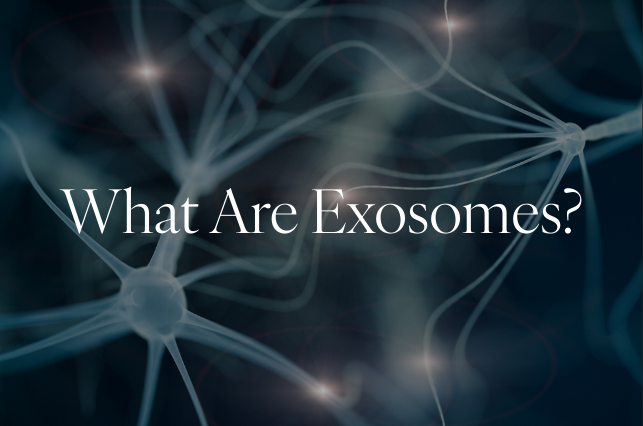What Are Exosomes?

An Introduction to Regenerative Cell Signaling - By Christopher Meadows, MD – Regenerative Medicine Specialist, Clinic 5C
In regenerative medicine, few areas of research are evolving as rapidly as exosome-based therapies.
These naturally occurring messengers are opening new doors in how we think about cellular communication, recovery, and age-supportive care.
At Clinic 5C, exosomes are sometimes used as part of personalized regenerative protocols, designed to support overall tissue health and cellular function.
While research is still emerging, exosomes offer exciting potential in the field of non-surgical, biologic support.
But what exactly are they? And how do they relate to other cell-based therapies?
What Are Exosomes?
Exosomes are tiny, naturally produced particles that are released by cells to carry messages between them.
They contain proteins, growth factors, and RNA that help cells "talk" to each other, especially during times of stress, injury, or repair.
These particles may play a role in:
- Coordinating immune responses
- Supporting healthy tissue environments
- Regulating inflammation
- Encouraging healing signals in the body
In clinical settings, exosome-based products are typically derived from perinatal tissue, which is a rich source of signaling molecules.
These preparations are processed under strict safety standards, without containing live cells or DNA.
How Are Exosomes Used in Regenerative Care?
While still considered investigational in the United States, exosomes are being studied for their role in supporting tissue health and recovery.
At Clinic 5C, we integrate exosome-based products into select regenerative care plans, based on patient needs and provider guidance.
Systemic Wellness and Recovery
Rather than targeting just one area, exosomes may help promote cellular communication throughout the body, supporting broader balance between immune, neurological, and metabolic systems.
Some patients are interested in exosomes as part of a proactive longevity or recovery plan.
Anti-Inflammatory Support
Chronic inflammation is associated with fatigue, tissue damage, and accelerated aging.
Preclinical research suggests that exosomes may influence inflammatory pathways, although more studies are needed to understand how this applies to real-world outcomes.
Aesthetic and Orthopedic Applications
Exosomes are also being explored in dermatology, hair health, and orthopedic support.
In some protocols, they are used alongside PRP or other non-surgical therapies to encourage tissue balance and recovery. They are similar but different to PDGF (Platelet-Derived Growth Factors), and PRP treatments, commonly used for Regenerative Cosmetics.
How Are Exosomes Different from Stem Cells?
While often discussed together, exosomes and stem cells are not the same. Here's a simplified distinction:
- Stem cells are living cells with the ability to replicate and differentiate into various tissues. They can detect signals from injured or inflamed areas and migrate to support repair.
- Exosomes are not cells themselves. They are signaling molecules released by cells (including stem cells), designed to amplify or coordinate the body’s natural communication networks.
Both may play unique roles in regenerative care and are sometimes used together in more comprehensive protocols.
Quality and Safety Considerations
Not all exosome-based products are created equal. At Clinic 5C, we only use products that:
- Are processed in FDA-registered, AATB-accredited facilities
- Follow FDA-compliant, minimally manipulated protocols
- Are third-party tested for purity and sterility
Exosome therapies at Clinic 5C are administered by Dr. Christopher Meadows, who has extensive experience in regenerative care and musculoskeletal medicine.
What Can Exosomes Potentially Support?
While no specific health outcomes can be guaranteed, exosomes are currently being studied for use in areas such as:
- Orthopedic recovery
- Skin and hair rejuvenation
- Immune and inflammatory support
- Longevity-focused wellness plans
- Cognitive and neurological health
As with any investigational approach, outcomes vary. Patients are encouraged to discuss potential risks and benefits with a licensed provider before proceeding.
Common Questions About Exosomes
Are exosomes FDA-approved?
Exosome-based therapies are currently considered investigational in the U.S. They are not FDA-approved to treat or cure any specific disease. We follow all compliance guidelines regarding their use.
Are exosomes safe?
When properly sourced and administered under medical supervision, exosomes have shown a strong safety profile. We use only rigorously tested, ethically sourced products.
How are exosomes given?
Depending on the patient’s goals, exosomes may be administered via localized injection (e.g., into joints), IV infusion, or as part of aesthetic or recovery procedures.
Is Exosome Therapy Right for You?
Exosomes are one tool in a larger regenerative toolbox. At Clinic 5C, we work with patients to determine whether exosomes, PRP, stem cells, or other therapies are appropriate for their unique goals.
Whether you're navigating an injury or simply looking to support long-term vitality, our team offers a clinical and individualized approach to regenerative medicine.
Talk With Our Team
If you are curious about regenerative therapies and want to explore the role of exosomes in supporting your health, we invite you to schedule a consultation with Dr. Meadows.
We are here to help you make informed, thoughtful decisions grounded in science and personalized care.
Ready to begin your wellness journey?
Fax: (844) 961-3417
Fax: (844) 927-4793



